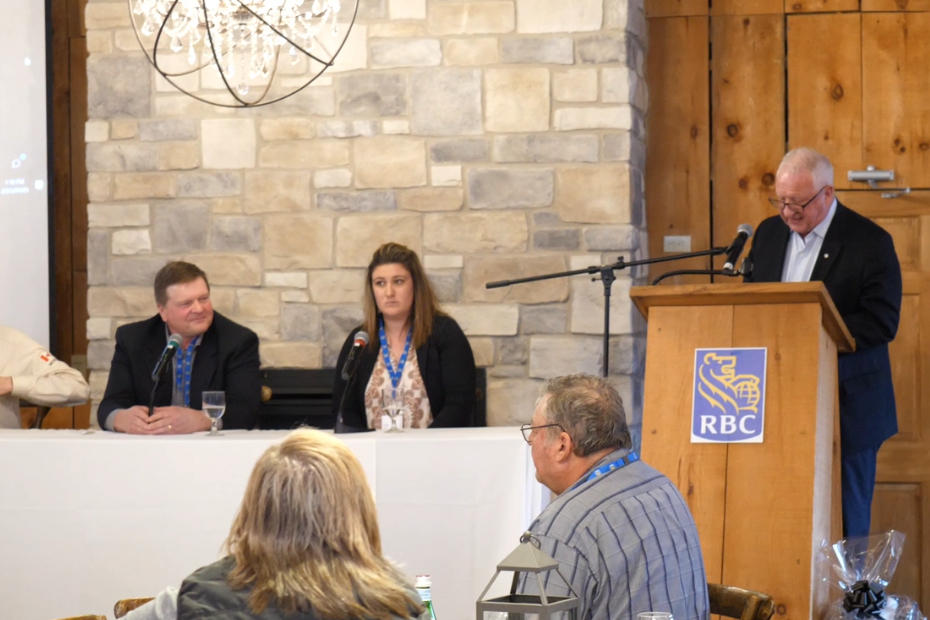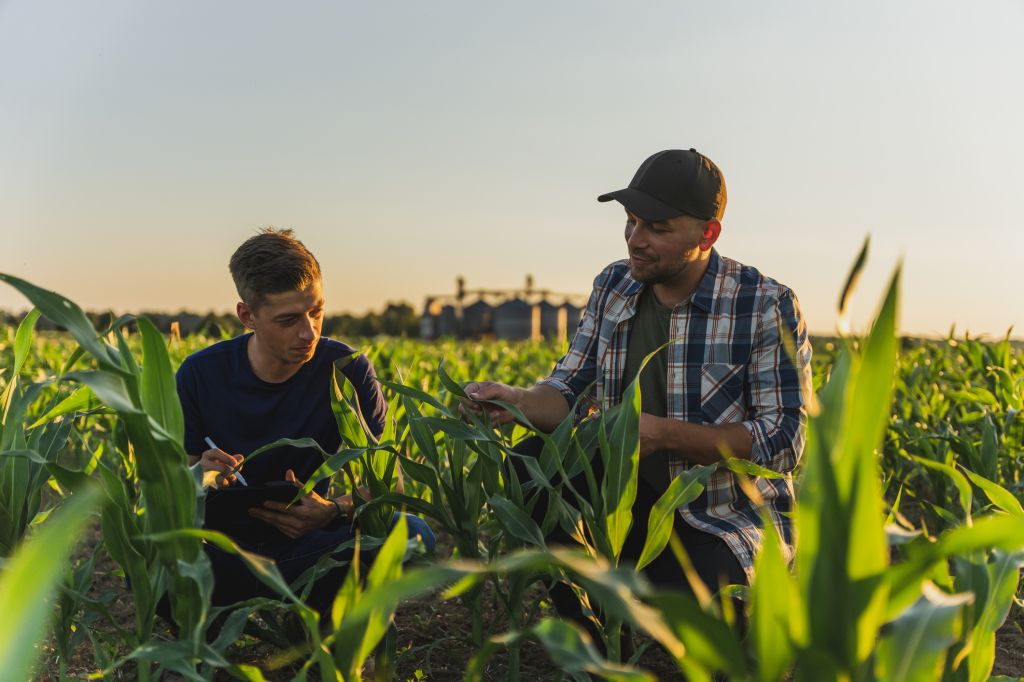The Next Green Revolution in Ottawa, Ont.: It’s time to celebrate the sustainable agriculture successes of our farmers

Published August 16, 2023 • 6 Min Read
Those in the agriculture industry in Ontario “have a lot to celebrate,” when it comes to sustainable agriculture as Julia Buckingham of Dairy Farmers of Canada pointed out at RBC’s The Next Green Revolution event in Ottawa in April 2023.
Panelists that joined her for the evening’s discussion included:
-
Bruce Hudson, Panmure Farms
-
Morley J Wallace, GPS Ontario
-
Laura Scott, Ontario Ministry of Agriculture, Food and Rural Affairs
Each spoke about their experiences working in the Ottawa area, where there’s just over 230,000 acres of farmland divided among over 900 farms. The local agri-food sector employs some 45,000 people, generating $223 million in farm cash receipts (with the top three being grains and oilseeds, dairy, and field vegetables).
From a sustainable agriculture perspective, statistics show, 14.7 per cent of the farms in the region generate renewable energy, including solar, bioenergy, and wind power. They also generate fewer and fewer greenhouse gas emissions, something that’s a trend nationally, notes Julia.
“Our last lifecycle assessment from 2016 shows that Canadian dairy production was responsible for less than one per cent of the greenhouse gas emissions in all of Canada, and that our footprint is less than half of the global average,” she noted. “We have a lot to be proud of.”
Morley agreed, adding farmers need to do a better job of getting the good-news truth about what they’re doing into the media.
“I think we need to be telling the public exactly what we’re doing and how efficient we actually are. We’re counting every seed that we put in the ground. We’re counting every pound of fertilizer that we’re putting into the soil. We’re documenting on paper where we put our insecticides and herbicides,” he said. “We should be telling [the public] more about what we’re actually doing and not leaving it for guessing.”
Bruce added that most farmers are constantly looking for ways to improve their carbon footprint while maintaining crop yields through technology and innovation. He said they have an inherent desire to protect and provide for their families and the community at large. No one really knows that, though.
“We’re doing a pretty darn good job and I think that’s why we’ve got to celebrate [that fact],” he said.
Of course, doing a lot of things well doesn’t mean the evening’s panelists thought their work in sustainable agriculture is done.
“We’re doing a lot well, [but] we still have room for improvement,” Laura noted, adding one area is to do more soil sampling, to help farmers determine most economical rates of fertilizer application.
“There are a shocking number of growers out there who still don’t soil sample, and it sounds so basic… they don’t soil sample; they don’t manure test,” she said. “There are lots of you in this room, I’m sure, that do it every three to four years like you’re supposed to. And you do it in zones and it’s done properly. But I have dealt with individuals in the past who had been farming for 30 years and have never pulled a soil test. You cannot build on what you do not know.”
Measurement is another critical area where improvement is needed, as Bruce pointed out. He noted that the industry is lacking the required data to properly inform policy decisions to help farmers get to net zero. By getting the numbers, he added, farmers will be able to defend what they do, improve where possible, and show the world how far they’ve already come. They may also get a say in policymaking. “We get told by everybody what we should be doing… but I don’t think we’ve been given credit for what we’ve already done.”
Morley agreed.
“I’m concerned that you have governments and government agencies that are making the rules and regulations for us. They’re telling us what we need to do, but they’re not putting in writing how to do it,” he noted. “How do we fix these things that you say we need to fix and not give us the solutions for that or the tools we need to do that?”
The speed at which regulations are being implemented is also a concern.
“As Bruce said, we’ve done so much already, and that’s not to be an excuse or a get out of jail free card… we’ve come this far and there’s no reason we can’t continue on, but I think we’re so zoned in on the word sustainability meaning that we’re keeping the phosphorus out of Lake Erie [and the like], but we’re not looking at the sustainability of making a farm eight generations.”
Julia agreed, noting that the word “sustainability” is used a lot, largely because it can describe so many things. She offered the suggestion of incorporating words like continuity, efficiency, and resiliency to bring greater understanding to these conversations.
“When we tie the economic piece and the social piece in with the environmental piece, then that can really help us to continue these conversations because we’re all interested in seeing our farms continue. We want to see our industry move forward. We want to make sure that our people are healthy and that we have a legacy to pass on to the next generation.”
She added that, going back to her earlier point, farmers have a lot to celebrate and should be given credit where credit is due.
“Farmers are extremely resilient people… [just] look at the last couple of years and the weather events that have been thrown at [them]… [they figured] out how to move forward and how to press on. Recognizing [that sustainable agriculture] is something we’ve already been doing as an industry, and that it’s in the way we think [is critical]. It’s not just a trendy word [for farmers].”
To learn more about RBC’s recent report The Next Green Revolution, click here.
You can also hear what agriculture industry experts and farmers at our other events had to say about the future of farming when it comes to sustainable agriculture.
While information presented is believed to be factual and current, its accuracy is not guaranteed and it should not be regarded as a complete analysis of the subject matter discussed. All expressions of opinion reflect the judgment of the author(s) as of the date of publication and are subject to change. No endorsement of any third parties or their advice, opinions, information, products or services is expressly given or implied by Royal Bank of Canada or its affiliates.
This article is intended as general information only and is not to be relied upon as constituting legal, financial or other professional advice. A professional advisor should be consulted regarding your specific situation. Information presented is believed to be factual and up-to-date but we do not guarantee its accuracy and it should not be regarded as a complete analysis of the subjects discussed. All expressions of opinion reflect the judgment of the authors as of the date of publication and are subject to change. No endorsement of any third parties or their advice, opinions, information, products or services is expressly given or implied by Royal Bank of Canada or any of its affiliates.
Share This Article





